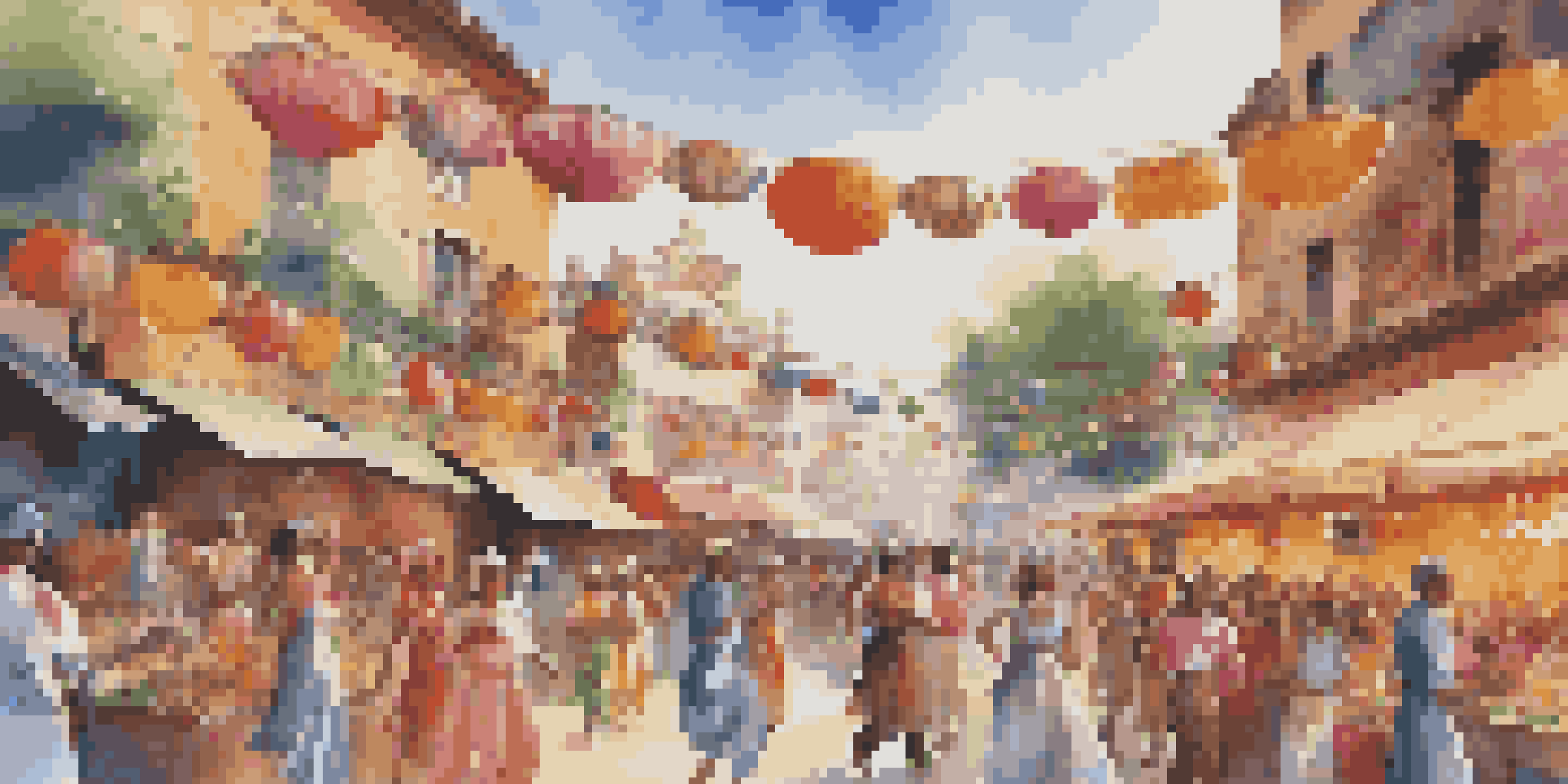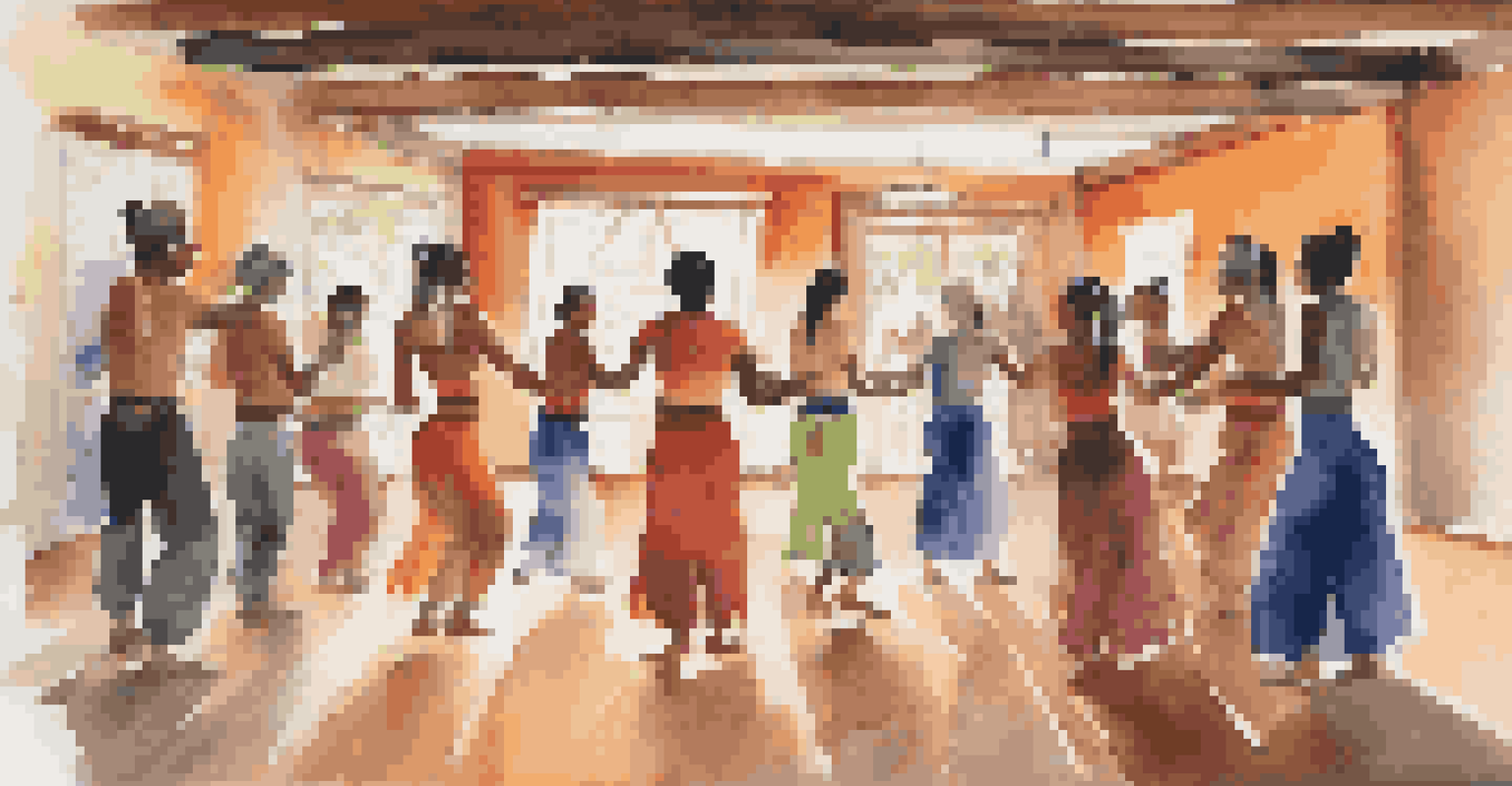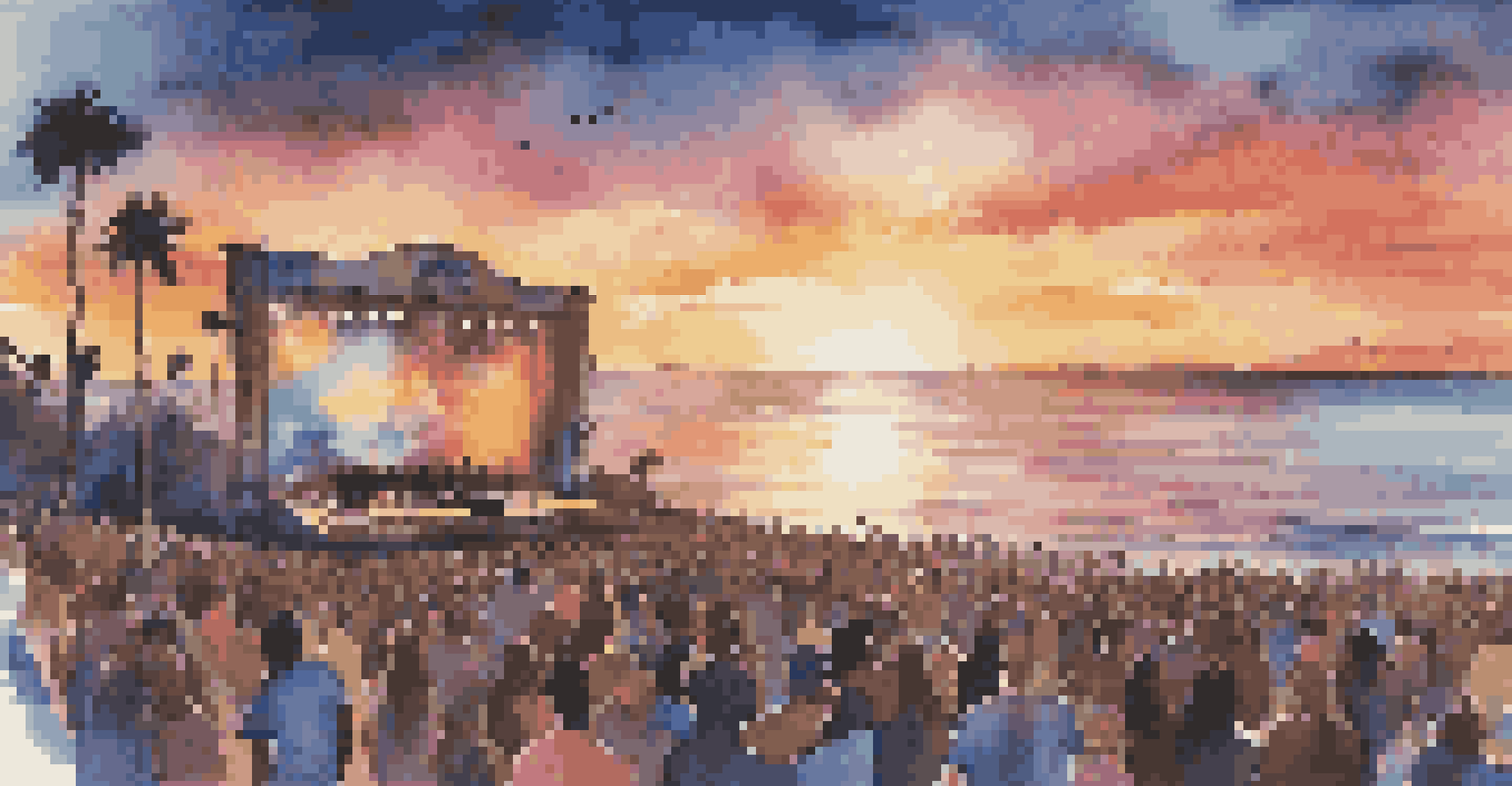Exploring Local Culture at Global Music Festivals

The Intersection of Music and Cultural Identity
Music is often seen as the universal language, but it also serves as a vital expression of cultural identity. When attending global music festivals, one can experience how different cultures communicate their stories through sound. For example, the rhythmic beats of reggae at Jamaica's Reggae Sumfest tell tales of resilience and joy.
Music is the shorthand of emotion.
Beyond just entertainment, these festivals allow local artists to showcase their heritage, creating a vibrant tapestry of cultural exchange. A performance at a festival can reflect a community's struggles, celebrations, and values, giving attendees a deeper understanding of that culture. This connection often leaves a lasting impression, fostering appreciation and respect.
Moreover, as attendees engage with local music, they often find themselves drawn to the cultural nuances embedded in the lyrics and performances. This engagement can turn a simple concert into an educational journey, where one learns about history, traditions, and social issues through the power of music.
Unique Cultural Experiences at Festivals
Each festival offers unique experiences that highlight local customs and traditions. For instance, the Rio Carnival is not just about samba music; it's a celebration steeped in Afro-Brazilian culture, where dance, vibrant costumes, and community spirit come alive. Participating in such festivities can make you feel like a part of something bigger than yourself.

Local cuisine also plays a significant role in these cultural showcases. Many festivals feature food stalls that serve traditional dishes, allowing attendees to taste the flavors of the region. Imagine savoring spicy Thai street food while listening to the enchanting sounds of a local band at a festival in Bangkok; it's a feast for the senses!
Music as Cultural Expression
Global music festivals serve as a vital platform for cultural identity, showcasing local artists and their stories through performances.
Additionally, workshops and interactive sessions at festivals provide opportunities for hands-on cultural immersion. Whether it's learning to dance the tango in Buenos Aires or making traditional crafts in Bali, attendees can take home a piece of local culture that transcends music.
The Role of Local Artists in Global Festivals
Local artists are often the heartbeat of global music festivals, bringing authenticity and depth to the event. These performers are ambassadors of their culture, sharing their stories through music that resonates with both locals and international attendees. Seeing a local band play at a global festival can create a sense of pride within the community, showcasing their talent on a larger stage.
Culture is the widening of the mind and of the spirit.
Moreover, the collaboration between local and international artists can lead to fascinating fusions of musical styles. For example, a collaboration between a traditional African drummer and a pop musician can create a unique sound that appeals to diverse audiences. This blending of genres not only entertains but also promotes cultural dialogue and understanding.
By spotlighting local artists, festivals can also help preserve endangered musical traditions. As younger generations become inspired by these performances, they may feel motivated to learn and carry on the cultural practices, ensuring that these rich heritages continue to thrive.
Cultural Exchange: Connecting Through Music
Global music festivals serve as melting pots for cultural exchange, where people from different backgrounds come together to celebrate music. The shared experience of enjoying live performances creates bonds that transcend language and cultural barriers. For instance, a crowd dancing together at a festival in Tokyo can include people from all walks of life, united by a common love for music.
This exchange doesn't just happen on stage; it extends to the audience as well. Attendees often share their own cultural practices, whether it's through dance, clothing, or storytelling. For example, a group of festival-goers may teach each other traditional dances from their respective cultures, leading to spontaneous moments of joy and connection.
Cultural Exchange and Connection
Festivals create immersive experiences that foster connections among diverse attendees, encouraging appreciation for different cultures.
Additionally, these interactions can spark curiosity and encourage attendees to explore new cultures beyond the festival. Many people return home with a newfound interest in the music, art, and traditions they encountered, fostering a greater appreciation for global diversity.
The Impact of Location on Festival Culture
The location of a music festival significantly influences its cultural flavor. For example, festivals held in coastal areas often incorporate elements of maritime culture, such as seafood cuisine and ocean-themed performances. The Natural Music Festival in Hawaii showcases traditional hula dancing, connecting attendees to the island's rich cultural heritage.
In contrast, urban festivals might highlight the vibrant street culture of their cities, featuring hip-hop, graffiti art, and local fashion. The SXSW festival in Austin, Texas, is a prime example, blending music with local tech and culinary scenes to create a comprehensive cultural experience. This unique setting makes each festival feel distinct and rooted in its community.
Ultimately, the geographical context of a festival enriches the overall experience, allowing attendees to immerse themselves in the local culture. By exploring the surroundings, festival-goers can discover hidden gems, from artisan markets to traditional workshops, adding layers to their understanding of the place.
Sustainable Practices and Cultural Preservation
As global music festivals grow in popularity, there's an increasing emphasis on sustainability and cultural preservation. Organizers are becoming more aware of their environmental impact and the need to respect local cultures. Festivals like Glastonbury have introduced measures to reduce waste and promote eco-friendly practices, ensuring that the beauty of local landscapes and cultures is maintained.
Moreover, promoting local artisans and businesses at festivals helps preserve cultural heritage while supporting the community economically. By featuring local crafts and foods, festivals provide a platform for traditional practices to thrive in a modern context. This not only benefits the local economy but also keeps cultural traditions alive for future generations.
Sustainability in Festivals
There is an increasing emphasis on sustainable practices at music festivals to preserve local cultures and minimize environmental impact.
Sustainable practices are about more than just environmental responsibility; they reflect a commitment to honoring the culture and community that hosts the festival. Attendees can feel good knowing that their participation contributes to a positive impact on both the planet and local traditions.
The Future of Cultural Experiences at Festivals
Looking ahead, the integration of technology in music festivals is set to enhance cultural experiences. Virtual reality (VR) and augmented reality (AR) can provide immersive experiences, allowing attendees to explore different cultures from the comfort of their homes. Imagine attending a festival virtually and interacting with artists and locals from around the world!
Furthermore, as global connectivity continues to grow, festivals may increasingly feature hybrid formats that blend in-person and virtual elements. This approach can broaden accessibility, allowing more people to engage with diverse cultures and music, regardless of their location. For example, a virtual ticket could allow someone in a different country to experience a festival live, fostering a global community.

As we move forward, it's crucial for festival organizers to remain committed to cultural authenticity and sustainability. By valuing and preserving local cultures, music festivals can continue to be a platform for connection, understanding, and celebration in our increasingly interconnected world.